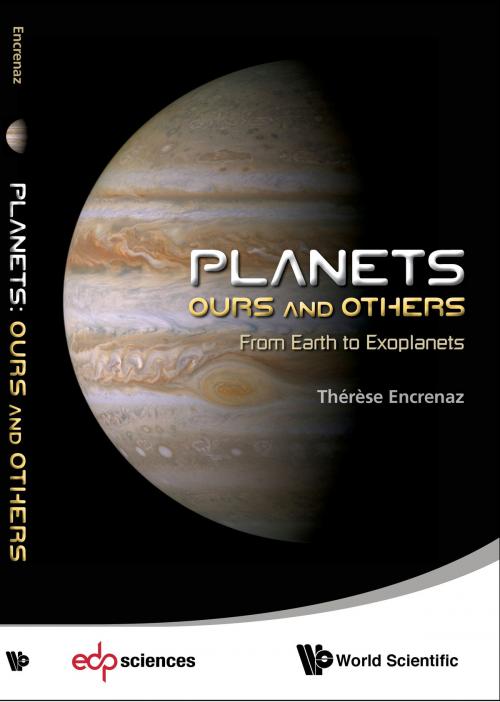Planets: Ours and Others
From Earth to Exoplanets
Nonfiction, Science & Nature, Science, Earth Sciences, Physics, Astronomy| Author: | Thérèse Encrenaz | ISBN: | 9789814525176 |
| Publisher: | World Scientific Publishing Company | Publication: | September 26, 2013 |
| Imprint: | WSPC | Language: | English |
| Author: | Thérèse Encrenaz |
| ISBN: | 9789814525176 |
| Publisher: | World Scientific Publishing Company |
| Publication: | September 26, 2013 |
| Imprint: | WSPC |
| Language: | English |
What is a planet? The answer may seem obvious; still, the definition of a planet has continuously evolved over the centuries, and their number has changed following successive discoveries. In 2006, the decision endorsed by the International Astronomical Union to remove Pluto from the list of planets has well illustrated the difficulty associated with their definition. The recent discovery of hundreds of exoplanets around nearby stars of our Galaxy opens a new and spectacular dimension to astrophysics. We presently know very little about the physical nature of exoplanets. In contrast, our knowledge on solar system planets has made huge progress over the past decades, thanks, especially, to space planetary exploration. The purpose of this book is first to characterize what planets are, in their global properties and in their diversity. Then, this knowledge is used to try to imagine the physical nature of exoplanets, starting from the few parameters we know about them. Throughout, we keep in mind the ultimate question of the search for possible extraterrestrial life: Could life exist or have existed in the solar system and beyond?
Thérèse Encrenaz is Emeritus Senior Scientist at the Centre National de la Recherche Scientifique. She works at the Observatoire de Paris, at the Laboratoire d'Etudes Spatiales et d'Instrumentation en Astrophysique (LESIA). She is a specialist of the study of planetary atmospheres, and has been involved in several space missions.
Contents:
- Introduction
- How to Explore Planets?
- The Birth of Planets
- Exploring Planet Earth
- The Neighbors of the Earth
- A Little Further, the Giant Planets
- Exoplanets, the New Worlds
- Searching for Habitable Worlds
Readership: Anyone interested in planets, both of the Solar System and beyond.
Key Features:
- There is no equivalent book (to my knowledge). This is the only popular book which revisits the concept of a planet in the light of the newly discovered exoplanets. It explains in particular why the Internal Astronomical Union decided, in 2006, to remove Pluto from the list of planets
- The book addresses all aspects of planetary physics, from internal structure to the magnetosphere. It also addresses the question of the quest for life in the Universe, a topic on which the public is very sensitive
- The book discusses the most recent results obtained by modern planetology, from ground-based observations with large telescopes to space observatories and space planetary missions. The new English version incorporates the most recent results by the planetary probes (Mars Express, the Martian rovers, Venus Express, Cassini) and the space missions devoted to the detection of exoplanets (CoRoT, Kepler)
What is a planet? The answer may seem obvious; still, the definition of a planet has continuously evolved over the centuries, and their number has changed following successive discoveries. In 2006, the decision endorsed by the International Astronomical Union to remove Pluto from the list of planets has well illustrated the difficulty associated with their definition. The recent discovery of hundreds of exoplanets around nearby stars of our Galaxy opens a new and spectacular dimension to astrophysics. We presently know very little about the physical nature of exoplanets. In contrast, our knowledge on solar system planets has made huge progress over the past decades, thanks, especially, to space planetary exploration. The purpose of this book is first to characterize what planets are, in their global properties and in their diversity. Then, this knowledge is used to try to imagine the physical nature of exoplanets, starting from the few parameters we know about them. Throughout, we keep in mind the ultimate question of the search for possible extraterrestrial life: Could life exist or have existed in the solar system and beyond?
Thérèse Encrenaz is Emeritus Senior Scientist at the Centre National de la Recherche Scientifique. She works at the Observatoire de Paris, at the Laboratoire d'Etudes Spatiales et d'Instrumentation en Astrophysique (LESIA). She is a specialist of the study of planetary atmospheres, and has been involved in several space missions.
Contents:
- Introduction
- How to Explore Planets?
- The Birth of Planets
- Exploring Planet Earth
- The Neighbors of the Earth
- A Little Further, the Giant Planets
- Exoplanets, the New Worlds
- Searching for Habitable Worlds
Readership: Anyone interested in planets, both of the Solar System and beyond.
Key Features:
- There is no equivalent book (to my knowledge). This is the only popular book which revisits the concept of a planet in the light of the newly discovered exoplanets. It explains in particular why the Internal Astronomical Union decided, in 2006, to remove Pluto from the list of planets
- The book addresses all aspects of planetary physics, from internal structure to the magnetosphere. It also addresses the question of the quest for life in the Universe, a topic on which the public is very sensitive
- The book discusses the most recent results obtained by modern planetology, from ground-based observations with large telescopes to space observatories and space planetary missions. The new English version incorporates the most recent results by the planetary probes (Mars Express, the Martian rovers, Venus Express, Cassini) and the space missions devoted to the detection of exoplanets (CoRoT, Kepler)















